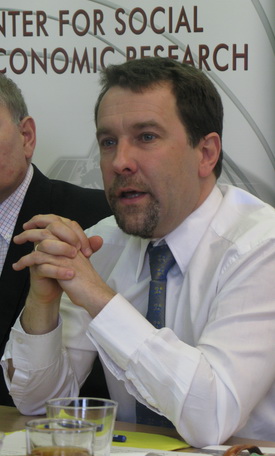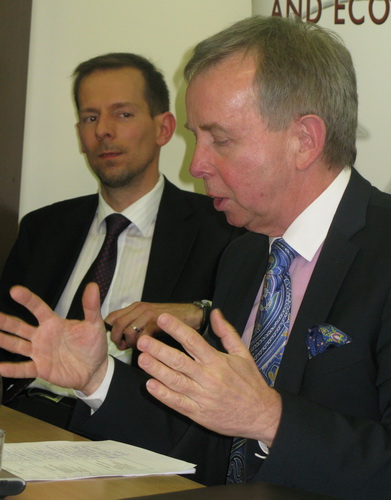CASE hosting the OECD Economic Survey of Poland 2012 presentations
CASE hosted Hervé Boulhol and Balázs Égert, Economists of the OECD presenting chapters of the OECD Economic Survey of Poland. Hervé Boulhol gave an insight of Poland’s macroeconomic policies in the current context and Balázs Égert was presenting on Climate-change policies: Minimising abatement costs for Poland. The OECD Economic Survey: Poland 2012 has been published on March 28th, and is available in OECD Library.
Toward a soft landing? – OECD Economic Survey for Poland
 Hervé Boulhol, Senior Economist at the Poland/France desk of the OECD, presented the Polish macroeconomic situation on the basis of OECD Economic Survey for Poland. Poland is the best performer within OECD in terms of cumulated real GDP growth since 2007. However, as indicated by the speaker economy is likely to slow down. There are two major weaknesses that Poland is facing: public finance and unemployment. In addition to this, other factors such as depressed demand in Europe, upside inflation risks, diminishing EU funds and exchange rate may drive real GDP growth down to 2¾-3 per cent in 2012-13.
Hervé Boulhol, Senior Economist at the Poland/France desk of the OECD, presented the Polish macroeconomic situation on the basis of OECD Economic Survey for Poland. Poland is the best performer within OECD in terms of cumulated real GDP growth since 2007. However, as indicated by the speaker economy is likely to slow down. There are two major weaknesses that Poland is facing: public finance and unemployment. In addition to this, other factors such as depressed demand in Europe, upside inflation risks, diminishing EU funds and exchange rate may drive real GDP growth down to 2¾-3 per cent in 2012-13.
OECD came with recommendations for Poland. Fiscal consolidation would help to limit price pressures, keep external debt under control and enhance fiscal credibility. Government should focus on:
- Cutting tax expenditures (5% of GDP)
- Further tightening eligibility criteria in the disability pension systme
- Reforming the KRUS
- Enhancing public-sector efficiency
- Shifitng the tax structure from labour to property and environmental taxes
Maciej Krzak, (CASE Senior Economist and Professor of Economics at Łazarski University) was more optimistic about growth. He believes that potential Polish GDP growth is higher than OECD forecasted. He also stated that Poland should not be worried about diminishing European Funds because so far they have affected only the demand side, and it is also the supply side that matters.
Climate-change policies: Minimising abatement costs for Poland
Balázs Égert, Economist at the Poland/France desk of the OECD, stated that Poland is on track to meet its international greenhouse gas (GHG) emissions commitments. However, current Polish energy policy focuses on energy security and competitiveness and implies little reduction in overall GHG emissions by 2030. Poland’s potential for reducing GHG emissions is substantial and should be realised in a cost efficient way. Abatement costs need to be minimised.
The OECD formulates the following recommendations:
- To equalise the implicit and explicit carbon prices across sectors economy-wide.
- The electricity market liberalisation shall be further pursued in line with EU Directives.
- Encouraging investment in renewable sources should be enhanced.
- Create a sustainable regulatory environment.
- Strengthen co-ordination between the numerous government entities and agencies responsible for the country’s energy efficiency strategy.

Adam Czyzewski (Chief Economist at Orlen) underlined again that climate policy is only efficient if accompanied by a world wide reduction effort. He further stressed the fact that climate policy includes costs, but needs to be seen as an investment in a safer future.
Luca Barbone, President of CASE Management Board, was chairing today's presentations.
An Economic Survey is published every 1½-2 years for each OECD country.
The OECD assessment and recommendations on the main economic challenges faced by Poland has been published on March 28th, 2012 and is available in OECD Library.
I Toward a soft landing? – OECD Economic Survey: Poland 2012 from CASE on Vimeo.

